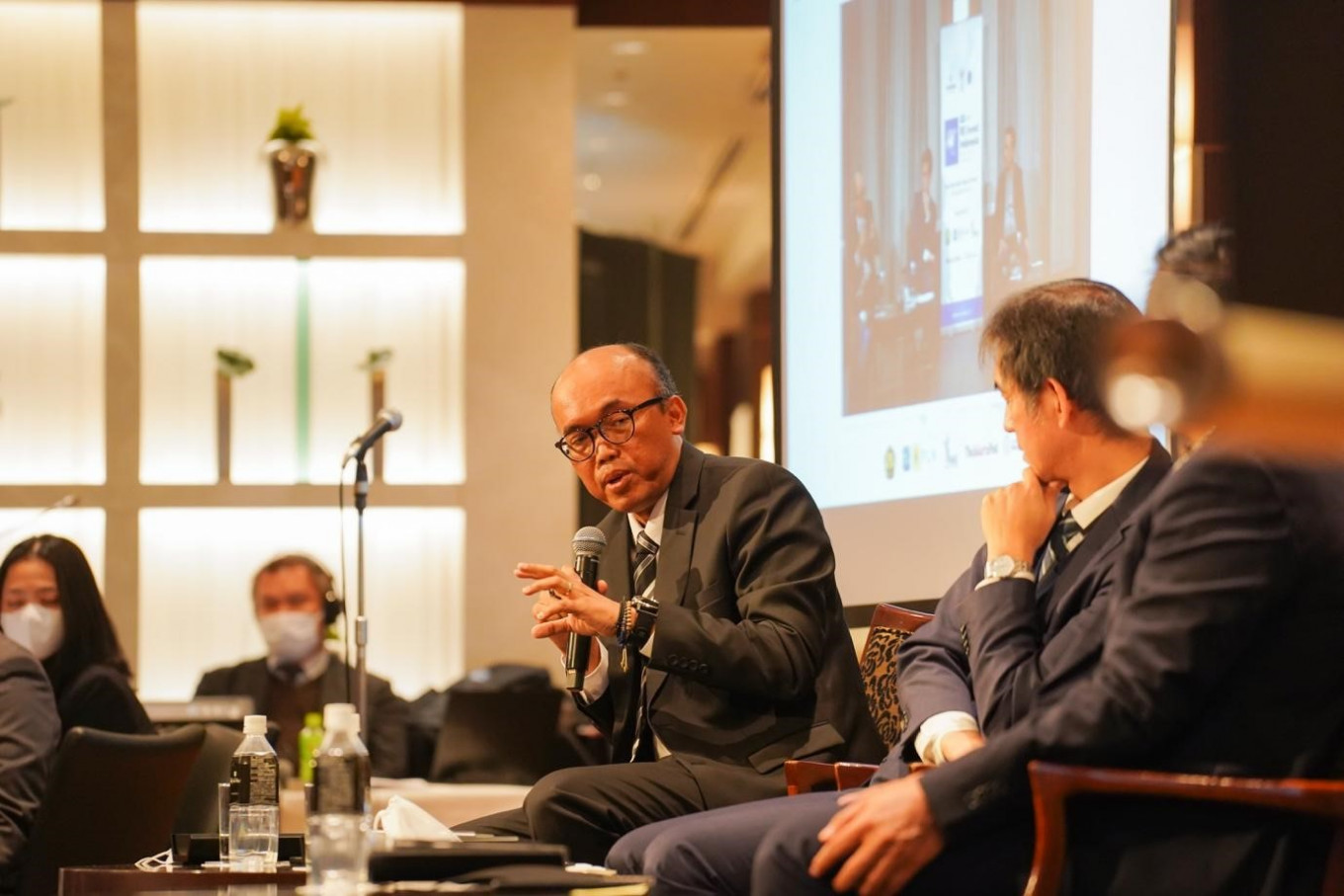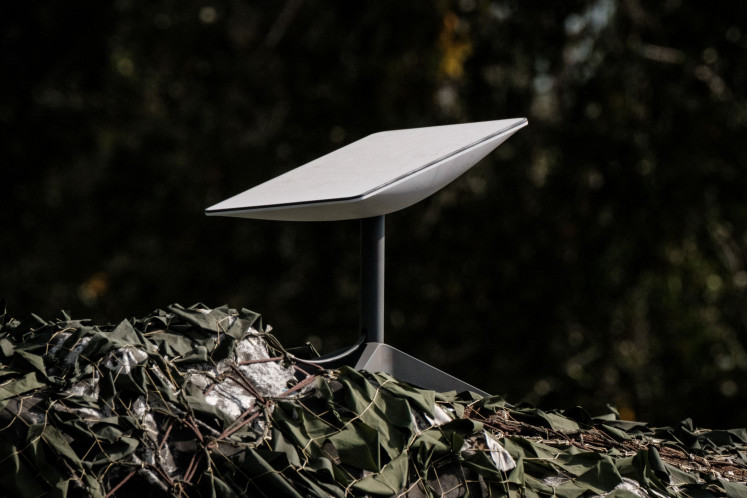Popular Reads
Top Results
Can't find what you're looking for?
View all search resultsPopular Reads
Top Results
Can't find what you're looking for?
View all search resultsPLN keeps net-zero 2060 commitment afloat with RUPTL at Japan RE Invest Indonesia 2023
Indonesia’s tackling of climate change sees the country committed to cutting carbon to net-zero by 2060, an ambitious yet promising goal that will see state-owned electricity company PT PLN on a journey to becoming a clean energy company.
Change text size
Gift Premium Articles
to Anyone
 PT PLN Director of Transmission and System Planning Evy Haryadi talks during the Japan RE Invest Indonesia 2023 in Tokyo on March 3, as the Japanese Economy, Trade and Industry Ministry’s (METI) Deputy Commissioner for International Affairs Izuru Kobayashi (second right) looks on. (Courtesy of the Embassy of the Republic Indonesia in Tokyo.)
PT PLN Director of Transmission and System Planning Evy Haryadi talks during the Japan RE Invest Indonesia 2023 in Tokyo on March 3, as the Japanese Economy, Trade and Industry Ministry’s (METI) Deputy Commissioner for International Affairs Izuru Kobayashi (second right) looks on. (Courtesy of the Embassy of the Republic Indonesia in Tokyo.)
I
ndonesia’s tackling of climate change sees the country committed to cutting carbon to net-zero by 2060, an ambitious yet promising goal that will see state-owned electricity company PT PLN on a journey to becoming a clean energy company. According to PLN, which holds a monopoly on the country’s electric power sector, it will expand its power capacity with clean technologies, with shares of renewable energy expected to increase from 32 percent in 2030 to 69 percent by 2060.
Speaking at Japan RE Invest Indonesia 2023 in Tokyo, PLN director of Transmission and System Planning Evy Haryadi laid out PLN’s strategy to support the government in achieving its target of Net-Zero Emission (NZE) 2060, which consists of continued implementation of energy transition initiatives aimed at shifting away from high-carbon power generation and enabling growth powered by new technologies.
Under PLN’s short-term goals, the company’s energy transition initiatives include the development of renewables, de-dieselization projects, the retirement of coal-fired power plants and biomass co-firing, which according to Haryadi, is a big community-based business as PLN would require around 14 billion tonnes of biomass products.
PLN’s long-term goals constitute energy transition initiatives, such as carbon capture utilization and storage (CCUS), a combination of renewables, battery storage and interconnections, as well as hydrogen co-firing, which has seen PLN collaborating with Japanese manufacturer Mitsubishi. Developing supporting technologies comprising electric vehicles, solar rooftops and an emissions trading scheme is also a part of PLN’s approach to reaching the NZE 2060 target.
However, these supporting energy transition initiatives also present a financial challenge, as PLN would need a total investment of more than US$700 billion.
It is important to note that reducing carbon emissions involves upscaling renewable energy, and data from PLN shows that between the years 2021 to 2030, renewable energy comprises approximately 52 percent or 20.9 gigawatts of planned additional national capacity. Currently, the total renewable energy capacity and energy share are at 8.5 GW and 14.1 percent, respectively.
With growing renewable energy demands due to industry developments and government policies, Haryadi noted that PLN would need to review its long-term electricity procurement plan (RUPTL). According to Haryadi, changes in the RUPTL relate to PLN’s forecasting of renewable energy demands and supplies in the country.
“In the previous RUPTL, we only forecasted the [renewable energy] demands. For the next RUPTL, we must discuss with the Energy and Mineral Resources Ministry to include scenarios we call demand forecast error. Reducing the growth [of demand] must be there, and another scenario is increasing growth. Also, another scenario must be related to supply,” said Haryadi.
Haryadi also revealed that to support increased consumption of renewable energy across industries, PLN has enabled the participation of stakeholders in green energy consumption and development through its Renewable Energy Certificates (REC).
Three of PLN’s renewable power plants are registered to issue RECs: Lahendong geothermal power plant, Kamojang geothermal power plant and Bakaru hydropower plant. To date, up to 1.9 terawatt-hour of RECs have been sold to 293 stakeholders ranging from consumer goods, business consulting and government institutions to retail and automotive manufacturers.
Held in a hybrid format on March 3, Japan RE Invest Indonesia 2023 brought together the Indonesian Embassy in Tokyo, PLN, PT Sarana Multi Infrastruktur, the Energy and Mineral Resources Ministry and energy companies from Indonesia and Japan to discuss renewable energy policy updates and investment opportunities as well as energy transition financing through the Just Energy Transition Partnership (JETP) and Energy Transition Mechanism (ETM) in Indonesia.
A total of 32 participants attended in person at the Japan RE Invest Indonesia 2023 in Tokyo, and 176 participants from 150 institutions attended the event online, which also served as a side event to the Asia Zero Emissions Community (AZEC) Ministerial Meeting, hosted by Japan’s Ministry of Economy, Trade and Industry (METI) on March 4.
Established by Tenggara Strategics in cooperation with the Centre for Strategic and International Studies (CSIS) Indonesia, Japan RE Invest Indonesia 2023 is a part of RE Invest Indonesia 2023, the third multi-stakeholder event of its kind aimed at bringing together renewable energy players from Indonesia, China, Japan and South Korea to invest in Indonesia’s renewable energy sector.
This article is written in partnership with Tenggara Strategics








